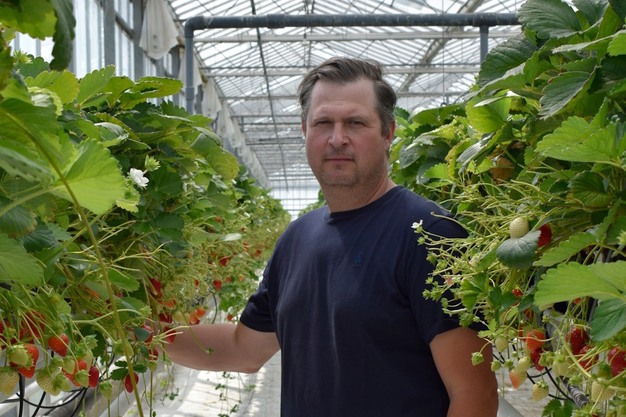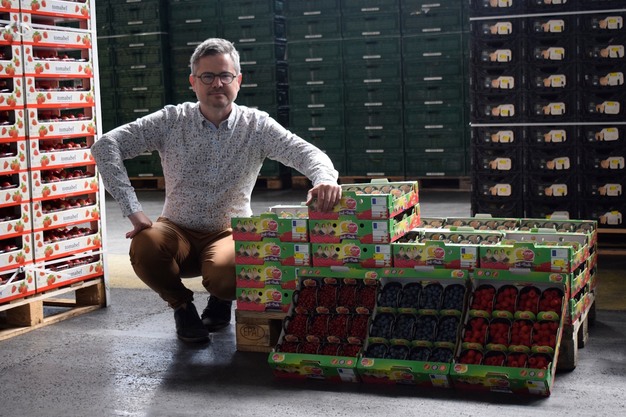Summer is here. That means hearty winter meals are making way for fresh, quick-to-eat dishes. Belgian cooperative REO, which sells its summer fruit via auction and commercial brokerage, is responding to that demand. Summer products, led by strawberries, continue to gain importance. But, they say, the new high season for small woody fruits got off to a sluggish start.
Strawberries
After an earlier start, thanks to the sunny spring, soft fruit's high season is in full swing at REO. Although supplies are gradually decreasing, seasonal open-field strawberries are still available. And those grown on racks are also still available in good volumes. "It's been unusually hot and dry since March," begins REO strawberry grower Pieter Van Houcke. "The sunny spring made for an excellent run-up to the summer season. So much so that spring crop production was higher."
 © REO VeilingPieter van Houcke
© REO VeilingPieter van Houcke
"It also began about ten days earlier than last year. In the first half of May, harvests from the 'cold' plastic-covered greenhouses were added. That combination resulted in strawberry supplies initially peaking at REO in mid-May. Supply-wise, 2025's daily record was provisionally set on May 14 with the delivery of 125,212 kg of strawberries. That's almost double the supply of two days earlier, of 71,611 kg," says Peter.
The strawberry season has, indeed, been quite palatable in West Flanders so far. In the first five months of 2025, REO offered a total of 1.63 million kilos of strawberries for sale. That is roughly 270,000 kilograms more than in the same period last year. Turnover rose by €2.72 million. "Consumers certainly love our tasty strawberries. But that's not the only reason why regional growers are increasingly cultivating strawberries."
"Lately, local strawberry production has risen due to further specialization among several REO strawberry growers. And they've invested in sustainable, modern cultivation techniques. The prolonged dry period in March and April, thus, didn't affect West Flemish strawberries badly. Growers have enough capacity to store sufficient winter rainwater," Peter explains.
Last month, the cooperative's strawberry growers abundantly harvested the June varieties (Sonsation, Falco, and occasionally Elsanta). The beautiful summer weather means production has peaked and is smoothly transitioning to Aurora Karima. This everbearing variety became the second most important variety at REO in just four years. "It's cultivated differently, but we're getting the hang of it."
"That's resulting in a more regular, stable strawberry supply pattern at the cooperative, where the summer berry supply will remain at a good level in the coming weeks, barring any setbacks. People have little to worry about regarding the continued availability or quality of West Flemish strawberries. Aurora Karima is highly resistant to the forecasted dry, hot summer," Peter points out.
Berries
Along with strawberries, small woody fruits are bringing summer into kitchens, according to REO. And that is a good thing, because those fruits are growing in popularity. Belgians are buying six times as many fresh berries now as 20 years ago: from 97g in 2002 to 636g in 2024. The volume of woody small fruits that the cooperative markets follows this trend. "That's tripled in the last ten years, and that figure continues to rise," says REO soft fruit product manager Jurgen De Braekeleer.
"For raspberries, the annual supply increased by about six percent in 2024, and for blackberries, it nearly doubled. Blackberry consumption remains limited, though. Like red currants, blackberries are still, for now, a niche product. Some Belgian shoppers buy them, so there's growth potential for both products. Growing berries and raspberries is also quite challenging."
"Thanks to the cold chain, our woody small fruit growers deliver their produce to REO up to three times a day. Along with this great care for product quality and freshness, our growers devote much time and effort to presenting their locally, artisanally cultivated produce in attractive packaging. They meet specific buyer requests regarding packaging, variety, size, etc., with great flexibility, too," says Jurgen.
 © REO VeilingJurgen de Braekeleer
© REO VeilingJurgen de Braekeleer
Raspberries
While frost and hail are plaguing Eastern Europe, the West Flanders season is going well so far. There is good coverage, and the small fruit is growing nicely. "However, cultivation remains vulnerable due to things like the increasingly limited availability of crop protection products. Many hands are needed to harvest the beautiful but fragile small fruit carefully. Labor remains the biggest cultivation cost, and staff availability is a major concern."
"Their expertise and market-oriented production certainly afford REO small fruit growers a place in the market. Unfortunately, they face fierce competition from imported products from regions with less regulatory pressure and unequal legislation regarding production and working conditions. For raspberries, that comes mainly from Morocco, Spain, and Portugal," Jurgen explains. "For blueberries, it's primarily Eastern Europe and Central America."
"Generally, for small woody and fresh fruit and vegetable sales, a level playing field on the international market is vital. That prevents locally grown products from being priced out of the market. That's also why REO keeps supporting and encouraging its trading partners to choose quality regional products over discounted imports. In other countries, small fruit is often picked early because of the long transport time. Here, growers can let the fruit ripen slowly until it's perfect to pick. That, of course, makes for better flavor and quality, and sustainability. You can be sure of the soft fruit if you buy it locally," Jurgen concludes.
For more information:
REO
Tel. +32(0)51 23 12 11
info@reo.be
www.reo.be
